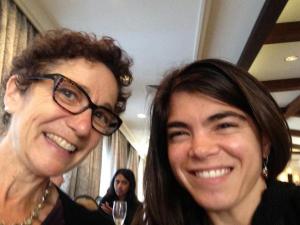By Roni Dengler
The pieces of cake were perfect. Their exacting 90-degree angles and planar surfaces evoked wonder from novice and veteran writers alike as we sat down to lunch in the El Capistrano dining room on Saturday afternoon.
Set among glasses brimming with iced tea, muted lime linen napkins and fine silverware, each slice taunted attendees at the One Minute Mentor Special Lunch tables. Dessert after all was the finishing touch to a meal that hadn’t yet started.
Starry-eyed and determined, only the slightest tinge of desperation in their eyes betrayed mentees to the self-assured and confident mentors. At three tables of 10, the conversation bubbled and rose into the clangor of a trade floor, mentees excavating mentors’ minds for their experience, advice and encouragement.Over the din, Ashley Yeager and Czerne Reid, who organized the event, addressed the crowd. Small connections early on served them well, steering them onto their current careers and even life trajectories.
“We hope to create an environment to engineer such connections,” Reid said.
Though Yeager and Reid emphasized the value of vertical mentoring, where accomplished vets offered sage wisdom to and shared their experiences with green neophytes, they also highlighted the value of peer-to-peer, horizontal mentoring.
“Nobody knows what you’re going through better than the people who are going through it with you,” said Lizzie Wade, a speaker and mentor at the event.
Overwhelmingly, the advice came down to execution.Put yourself out there. Meet as many people as possible. Build and maintain a network over time. Stay in contact with mentors, and editors. Pitch as much as you can (and try to not be disheartened with rejection; we’ve all been there). Go to j-school. Get an internship (an incredible springboard for clips and contacts, according to Macon Morehouse). Take risks. Explore.
If you do these things, eventually it’ll all come together. Retrospectively, it’ll all seem magical, Maggie Koerth-Baker and Lizzie Wade agreed, as if it wasn’t that hard to do, perhaps because it isn’t.
Do your very best work. File clean copy on time. Period. (And if you need to file a draft that’s rough, stay in contact with your editors about this. Make sure the copy’s accurate. Editors can fix one problem, but not the other.)
Figure out what you like. Get to know people. But, most importantly, try.


